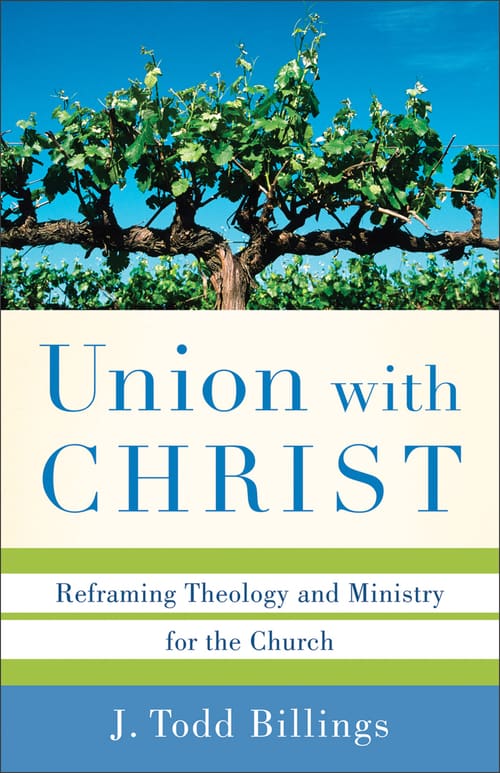Union with Christ: Reframing Theology and Ministry in the Church by J. Todd Billings. Baker Academic, 2011. 192pp.
Heavenly Participation: The Weaving of a Sacramental Tapestry by Hans Boersma. Eerdmans, 2011. 224pp.
Sometimes quibbles are a sheer exercise in esotericism and speculation. As expressions of intellectual acrobatics, they demonstrate what is at the heart of the debate: self-indulgence, arrogance, and entertainment. But once in a while they take a turn for the best: they produce moments of profound clarity and insight for everyone involved, interlocutors and auditors alike. At these times, they can matter for those who have invested their lives in a certain topic as well as those who, before now, never knew it was even a question.
Sometimes quibbles are worth it. Sometimes they can actually be applied and appreciated beyond the cloister of pundits. Sometimes they make sense, and this sense can change our sensing of things.
The theological quibbles introduced and engaged in Todd Billings’s and Hans Boersma’s new books are the kind of quibbles that change one’s sense of things. In fact, both think that if their views are adopted, they can have significant import for the Christian life. Billings, in particular, highlights various issues and misconceptions in contemporary Reformed theology that, if corrected, he thinks can be instructive and facilitative for ministry and vocation. Similarly, Boersma seeks to retrieve a “Great Tradition” that he thinks would change the outlook of Christian enjoyment and practice. Both authors want to clue Christians into—and help them appreciate—the dynamic nature of understanding and identity as they relate to ministry and vocation.
John Calvin was adamant that how we understand Christ’s work impacts our religious life. Particularly, how we understand Christ’s work impacts how we perceive our own work. Billings carries this baton, emphasizing that understanding the Christian life as union with Christ is a startling and life-altering perspective. Union with Christ means a transformation of the identity and life of the one united. As Paul did, the imagery of adoption can be invoked here. In being united to Christ one is adopted, and as in the case of every adoption, new things come about. One has new parents. A new family. A new neighbourhood with new neighbours. New chores and new playgrounds. New jobs and new schools. New labour and new leisure. Adoption brings about change. It brings about a change of world. But more extensive than biological and social adoption, adoption in Christ brings about a change of cosmos (Col. 1:15-20).
This change in the cosmos means the gospel is intimately tethered to social justice. Because Christ didn’t come to rescue us from this place but this situation, how we live and how we understand our living is important. The gospel and social justice are two peas in the pod of communion with God. In fact, the gospel itself is an act of social justice. Through it, God attends to our material condition, not just our spiritual one. Any act of social justice, if it be a true act of justice, must take its form from the gospel. Preaching the gospel (Matt. 28:16-20) and seeking justice (Micah 6:8) are one movement in the choreography the triune God has laid out for us.
In seeking justice we have the work of Christ and the power of the Spirit that goes before us. But, rest assured, we’re not going to make the impact we may hope for. We’re not heroes, and we’re not expected to be. As Billings puts it, we’re not called to be Jesus and incarnate the gospel; we’re called to follow Jesus and participate in the work he has already done. We are not called to usher in the kingdom. We will not bring Jesus back. We cannot redeem or restore all that we want or feel. We can’t fix anything and everything we put our hand to. The gospel has come, and God continues to work, but things will not be as they should be until the one returns who can make them that way. We must remember this—for this is why we not only have faith and love, but hope. We hope for the end of this beginning.
This need to hope, and the grace that enables it, is necessary for us lest we become to “this-worldly.” In the eyes of Hans Boersma, this is what evangelicalism has become. But even more than this, it has become “anti-heaven.” And this “this-worldliness” and “anti-heaven” outlook can have harmful effects on our ministry and vocation. As Boersma makes clear, it is a tragedy to forget about heaven and its relevance for Christian living. But the tragedy doesn’t simply lie in the forgetting of heaven, per se, but the forgetting of heaven’s relation to earth. You see, to forget heaven is to forget that we are pilgrims in a foreign land (1 Pet 2:11). It is to forget that we are citizens of a heavenly city. It is to forget that heaven is our home.
There is a “Great Tradition” of Christian thinking that is available for reflection here, and Boersma draws our attention to it. This “Great Tradition”—composed of the church fathers and medieval theologians—offers a “sacramental mindset” for seeing created realities afresh. Drawing upon this tradition challenges us to see created realities as they participate in heavenly ones. As Boersma argues, heaven and earth cannot be understood as two separate realities, but two mysterious threads in a “tapestry.” They are a whole. But earth is something of an instrument for heaven. It is a sacrament for seeing and living in God’s presence. It is a means for God to be present to his creatures. This “sacramental mindset” needs to be retrieved, for it can assist us in governing our life and ministry as it has for so many centuries.
We need to mystify reality, because that is what it is. Reality is a mystery. What you see before your eyes is not all to be seen. Observations and appearances are not all that appear and can be observed. Something lies hidden in the revealed. Something is revealed in the hidden. We are surrounded by more than ourselves; what surrounds us are “heavenly realities.” The earthly realities we participate in participate themselves in heavenly one. Consequently, we too, participate in heavenly realities. Heaven is where earthly realities find their meaning and significance. The “other-world” gives meaning and significance to the “this-world.” Heaven situates earth. This is not to say, Boersma cautions, that heaven negates earth—it’s only to say it puts it in context. And it is this emphasis on the “other world” that is needed to focus ourselves in “this world.” As he puts it, a healthy dose of other-worldliness can offer an appropriate kind of this-worldliness. After all, what use would it be reform public policy, end famine, and cure cancer if you lose your soul? (Matt. 16:26)
Billings and Boersma offer quite similar challenges and encouragement for our ministries and vocations. Both want to make sure God remains God. This is not our story. We are not the protagonists. Our families, friends, jobs, educations, delights, and fears are oriented by and grounded in another story. Our story begins with a story. Similarly, both want to make sure we don’t try to bring God’s kingdom to earth. We participate in something much larger and beyond ourselves. In fact, we participate in something that is already accomplished. We don’t need to do what Jesus did. And while we couldn’t anyway, we aren’t expected to thank God. Our calling is one of faith and witness. We are simul spectator et actor. Billings and Boersma want to help us appreciate the sense in which God is present in this world and acting within. We are not alone. To believe this is not naive. To experience this is not mystical. To live this is not fantastical. There are realities to be seen in our workspaces, grocery stores, tennis courts, and libraries that many of us are missing out on. It’s time we shaped up—time we got real.
But.
We should proceed with caution. The Christian tradition has talked a lot about “heavenly realities,” but, ironically, many have no idea what that means. In this regard, ours is a tradition of speculation. We can’t point to heaven. We can’t describe it. We can’t distinguish an experience of it from another. And when we try to come to some concept of it, we cannot hold this concept too tightly, for we just don’t know what it is. The fact of the matter is that all we really know is earth.
And I think, there’s a reason for that: We were not created for heaven. We were created for earth. And that is why earth is the “world” in which we live. Yes, earth does participate in another world—Boersma is right here—but this “other world” is created, too (Genesis 1:1). And if we take the time to see it, the picture given to us in Scripture is one in which the heavenly realities are as richly varied as our own. But we must take caution in confusing the spiritual and material, visible and invisible, or considering one more important and significant to God than the other.
Related to this, we mustn’t think of earth in utilitarian terms. It is not made to be an instrument or stepping stone to heaven. Angels were created for heaven; we were created for earth. While our “worlds” may overlap, they are not meant to be confused or compared and contrasted on a scale of “invisible” value. There is an order to creation, and each must play its part. We must take seriously our nature as spiritual and material beings: In God’s image, but also created, we are unique beings God has placed on earth—not in heaven.
This means something. I like to think it means that we are called to do something neither angels nor inanimate organisms can do. Think about that next time you buy a dog, plant a garden, clean a sidewalk, or make an album. You are called and able to do something no other creature can and perhaps will. Do it honourably and humbly. Earth is a lot more meaningful and significant to God than we might think. Accordingly, we are given a lot more influence, purpose, and responsibility than we might think. While there is a danger to be found in this train of thought, there is an equal amount of danger in not following it.
God is present in your job, your spouse, your children, your family, your friends, your city, your home, and so forth, and he is there to be enjoyed and contemplated. But God is active in these things, shaping you and challenging you as you become a child, disciple, friend, brother or sister, and lover of his. Billings and Boersma are right: without an awareness and recognition of the origin, condition, and goal of this world, we distort our vocations and ministries and fail to do what we are called to. There is a link to our identity that cannot be lost or forgotten. We have been tagged. And no one can tear this tag off (Romans 8:38-39), not even ourselves (Romans 1).
Someone who believes God can “speak” through a donkey might actually take the time to listen. Someone who believes God “works” through children might surround themselves with them. And someone who thinks God constantly acts in and through this world might be a little more attentive to what he’s doing when drafting policies and voting. This understanding and way of sensing reality has relevance for our vocation and ministry, whether we are animal care and service workers, daycare workers, or public officials.


